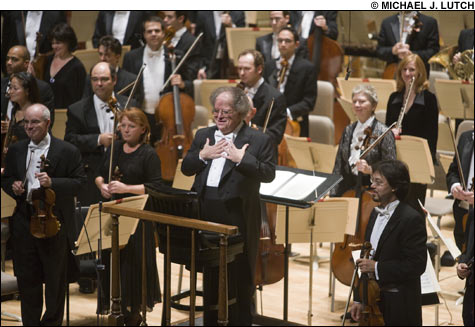
WELCOME BACK! James Levine’s return to the podium drew a standing ovation. |
The most moving moment of this year’s Boston Symphony Orchestra opening gala came before the concert started — the standing ovation for James Levine, who looked rested and recuperated after his kidney surgery this summer, an operation that forced him to cancel most of his Tanglewood season. BSO galas have veered from the high-serious (Mahler’s Resurrection Symphony, the Verdi Requiem) to last year’s lighter-weight Ravel program and this year’s Russian zakuski. The Overture to Glinka’s Ruslan and Ludmila and Mussorgsky’s Pictures at an Exhibition (in Ravel’s orchestration — as if we hadn’t had enough Ravel) sandwiched the “Letter Scene” from Tchaikovsky’s Eugene Onegin, an opera Levine had planned to conduct at Tanglewood.
Levine led the Tchaikovsky — and the orchestra played it — with great urgency and sensitivity. The “letter” is lovestruck young Tatiana’s declaration of passion for Onegin, a self-centered sophisticate who couldn’t be less interested in this gushy innocent. Throbbing tremolos conveyed those feelings even before Latvian soprano Maija Kovalevska began to sing. Decked in diamonds (credited in the program to Shreve, Crump & Low — a BSO first?), she’s as pretty as Anna Netrebko and has a vibrant, colorful voice. (She’s a student of the beloved Italian soprano Mirella Freni, who sang this scene at a BSO gala in 1990.) She sounded awfully mature for Tatiana. I missed emotional nuances, a sense of urgency, desperation, ecstasy. John Ferrillo’s oboe captured more of Tatiana’s feelings than Kovalevska did.

The Glinka and the Mussorgsky were brilliant (outstanding work from Thomas Rolf on trumpet and Kenneth Radnovsky on alto saxophone) but more orchestral showpieces than explorations of the Russian soul. Isn’t that what people were paying a top price of $2500 (including dinner) for? I guess that’s what galas are all about — and that’s one of the things that are wrong with galas.
But there was nothing wrong with the Ein deutsches Requiem that Levine led a couple of days later at the first BSO subscription concert. There were two superlative soloists: pixyish soprano Christine Schäfer, with her pure tone, strong projection, and musical understanding, and handsome, rich-voiced, characterful German baritone Michael Volle, in his BSO debut. I’d like to hear Volle’s Don Giovanni and Eugene Onegin, roles he sings in the major European houses. John Oliver’s Tanglewood Festival Chorus was at its most full-hearted (men in the middle, sopranos on one side, altos on the other, so Brahms’s great fugues had extraordinary clarity). The orchestra played at its peak. And Levine conducted as if he were sculpting — shaping phrases into movements and movements into an all-embracing continuum.
As Brahms biographer Jan Swafford points out in his program note, Brahms’s title suggests not the Requiem, just a requiem, a German (not Latin) prayer for the dead (in this case Brahms’s mother and his beloved mentor Robert Schumann) and for those who mourn them. Brahms once told someone who noticed the absence of any Christian references that he had thought of calling it a human requiem. This is just what Levine gave us: not a piece of religiosity but something even more spiritual, heartfelt, sorrowing but hopeful. In the second movement, the scary dirge-like funeral march (“For all flesh is as grass”) morphed almost imperceptibly, leisurely, into one of Brahms’s most radiant and consoling melodies. It was a model of the whole Requiem. Even deeper than the pain of loss is the blessing that the dead can now rest from their labors.
I think my very first encounter with pianist Russell Sherman — well over 30 years ago — was hearing him play all of Liszt’s 12 Transcendental Études (Études d’exécution transcendante). Few pianists attempt more than one on a program. To celebrate the release of a Transcendental DVD he made in 2004 (he’d already recorded the entire set twice), the 78-year-old master pianist gave a remarkable free concert at Jordan Hall last Thursday to a near-capacity crowd. The études are still a wild ride (the title of No. 8 is Wilde Jagd — “wild hunt”), and if some of the wilder ones now convey a certain effort that isn’t on his recordings, the quieter, more thoughtful, more exploratory pieces have deepened.
I rarely find Liszt moving, but the second Sonetto del Petrarca (Petrarch’s Sonnet No. 104), with which Sherman began the concert, offered a world of grave and sublime contemplation, and the longer, more searching études — Paysage (No. 3, a pastoral landscape), Ricordanza (No. 9, “Remembrance”), Harmonies du soir (No. 11, “Evening Harmonies”) — were heartbreaking in their spiritual beauty, an intention Sherman has always been quite explicit about. His Liszt isn’t just sound and technical fury but a living through of complex experiences. Ricordanza became a scenario of multiple converging memories. The mysterious arpeggios and rising lines of Harmonies du soir suggested bubbles trying to escape the pull of the earth — and succeeding (Sherman once called this piece “a chant of praise to harmony itself”). Equally spellbinding was his powerful, windswept Allegro agitato molto (No. 10), which despite its abstract title had, like everything Sherman plays, its own compelling underlying narrative launched from the extremes of the keyboard.